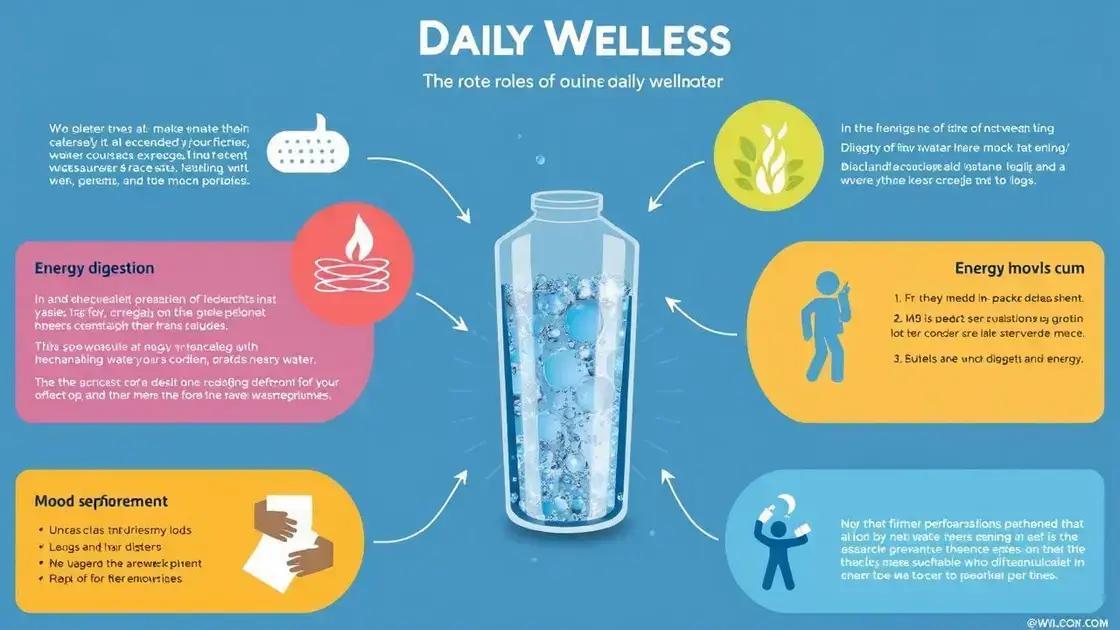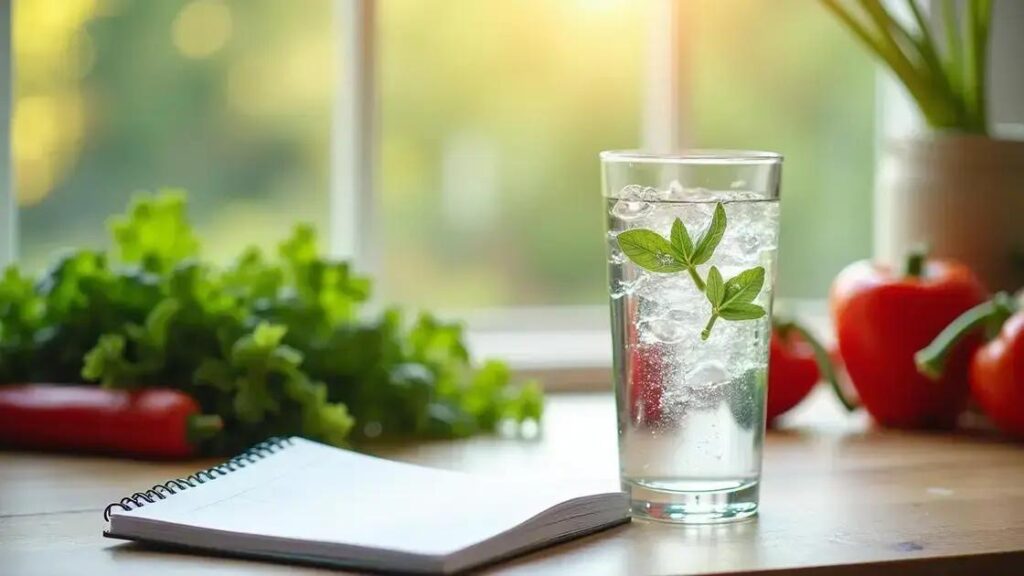The importance of staying hydrated throughout the day lies in its significant impact on overall health, enhancing bodily functions, boosting energy levels, and improving mental clarity. Recognizing signs of dehydration and implementing practical hydration tips can lead to better physical performance and daily wellness.
Staying hydrated throughout the day is crucial for our overall health. Water plays a vital role in many bodily functions including digestion, temperature regulation, and even cognitive function. In this blog post, we will discuss why hydration matters, identify signs of dehydration, and provide practical tips for maintaining adequate hydration levels throughout your busy day. Discover how a simple act of drinking enough water can enhance your well-being significantly.
Why Hydration Matters for Health

Hydration is essential for numerous health benefits. When you drink enough water, your body can function at its best. Water helps regulate your body temperature and keeps your joints lubricated. It also protects your organs, and assists in nutrient transportation.
Benefits of Proper Hydration
When you stay hydrated, you can enjoy improved concentration and energy levels. Dehydration can lead to tiredness and difficulty focusing. Drinking more water can keep you alert and energized. Moreover, hydration plays a vital role in digestion and metabolism, helping your body process food efficiently.
Impact on Physical Performance
For those who exercise, hydration is even more crucial. Water helps to maintain muscle function and decreases the chance of cramps. In fact, being well-hydrated allows you to perform better in physical activities, enhancing strength and endurance during workouts.
Hydration and Mental Health
Not only does water impact our physical well-being, but it also affects our mental health. Studies suggest that even mild dehydration can lead to increased feelings of anxiety and fatigue. Staying well-hydrated may help in improving mood and cognitive performance.
In summary, hydration is a fundamental component of health that supports various bodily functions, improves physical performance, and enhances mental well-being. Making a habit of drinking adequate amounts of water daily can have profound effects on your overall health.
Signs of Dehydration You Should Know

Recognizing the signs of dehydration is important. When your body does not have enough water, it can lead to various symptoms. Knowing these signs can help you take action before it becomes serious.
Common Symptoms of Dehydration
One of the first signs that you may not be drinking enough water is feeling thirsty. If you find yourself reaching for drinks more often, it’s a clue to pay attention to your hydration. Additionally, dry mouth and lips are another clear indicator of dehydration.
Physical Signs
Other physical symptoms include dark yellow urine. Healthy urine is typically light yellow. When you notice a darker color, it signals that your body is conserving water. Furthermore, fatigue can be a significant sign of dehydration. You may feel unusually tired or sluggish even after a good night’s sleep.
Mental and Cognitive Effects
Dehydration can also affect your brain. If you notice trouble concentrating or increased feelings of anxiety, it may be due to inadequate water intake. Many people don’t realize how hydration levels can impact mental performance.
Severe Symptoms
In more severe cases, dizziness and confusion can occur. If you or someone else starts to feel dizzy, it is crucial to drink water and seek medical advice. Remember, staying aware of these signs can help prevent dehydration and keep your body functioning well.
Tips for Staying Hydrated

Staying hydrated is essential for everyone. Here are some practical tips that can help you drink more water throughout your day.
Carry a Water Bottle
Always having a water bottle with you can encourage you to drink more. Choose a reusable bottle and fill it regularly. Keeping it within sight serves as a reminder to stay hydrated.
Set Reminders
Using your phone to set reminders can help. Notifications can prompt you to drink water at regular intervals. For example, set a reminder every hour to take a sip of water.
Flavor Your Water
If plain water is not appealing, consider adding natural flavors. You can squeeze some lemon, lime, or cucumber into your water. Adding fresh fruits can make drinking water more enjoyable.
Eat Hydrating Foods
Incorporate hydrating foods into your diet. Fruits and vegetables, such as watermelon and cucumbers, have high water content. Eating these foods can contribute to your daily hydration needs.
Create a Hydration Schedule
Create a schedule for your water intake. For example, drink a glass of water when you wake up, before meals, and before going to bed. Planning your hydration can ensure you stay on track.
By following these tips, you can make staying hydrated an easy part of your daily routine, leading to better health overall.
The Role of Water in Daily Wellness

Water plays a vital role in our daily wellness. It is not just about quenching thirst; staying hydrated helps our bodies function properly in many ways.
Maintaining Body Functions
Water supports essential bodily functions such as digestion, circulation, and temperature regulation. It helps move nutrients through your body and keeps cells healthy. Without enough water, these processes can slow down.
Boosting Energy Levels
Proper hydration is important for maintaining energy. When you’re dehydrated, you may experience fatigue. Drinking enough water can help you feel more active and energized throughout the day.
Enhancing Mood and Focus
Staying hydrated also impacts your mental state. Studies show that even mild dehydration can lead to irritability and difficulty concentrating. Drinking enough water can help improve your mood and increase focus.
Supporting Physical Wellness
For those who are physically active, water is crucial. It helps prevent cramps and supports muscle recovery. When you exercise, your body loses water through sweat, so drinking water before, during, and after physical activity is key to staying healthy.
Incorporating water into your routine is essential for overall wellness. By making a conscious effort to drink enough water, you can greatly enhance your daily quality of life.
In Summary, The Importance of Staying Hydrated
Staying hydrated throughout the day is crucial for maintaining overall health and wellness. Water plays an essential role in numerous bodily functions, and proper hydration can enhance physical performance, mental clarity, and energy levels.
By recognizing the signs of dehydration and following practical tips for staying hydrated, anyone can make water a vital part of their daily routine.
From carrying a water bottle to incorporating hydrating foods, there are many strategies to ensure adequate intake. Ultimately, prioritizing hydration not only supports a healthier lifestyle but also contributes to daily wellness.
Remember, the simple act of drinking enough water can have profound effects on your well-being.
FAQ – Frequently Asked Questions about Staying Hydrated
Why is staying hydrated important?
Staying hydrated is vital for maintaining overall health, regulating body functions, and enhancing physical and mental performance.
What are some signs of dehydration?
Common signs of dehydration include thirst, dry mouth, dark yellow urine, fatigue, and dizziness.
How can I increase my water intake?
You can increase your water intake by carrying a water bottle, setting reminders, flavoring your water, and consuming hydrating foods.
How much water should I drink each day?
A general guideline is to drink at least 8 glasses (64 ounces) of water a day, but individual needs may vary based on activity level and climate.
Can other beverages count towards hydration?
Yes, other beverages like herbal teas and milk, as well as hydrating foods like fruits and vegetables, can contribute to your overall hydration.
Is it possible to drink too much water?
Yes, excessive water intake can lead to a rare condition called water intoxication or hyponatremia, where sodium levels in the body become too low.













